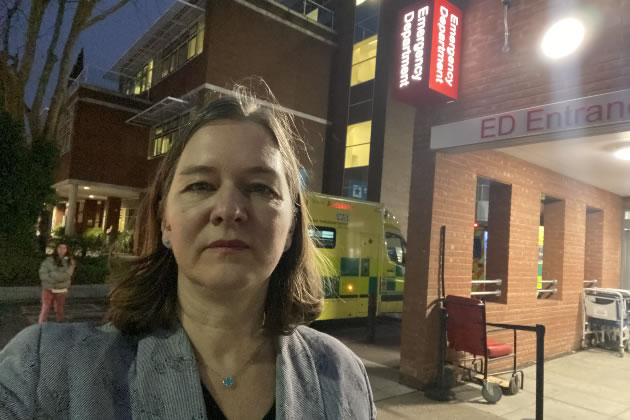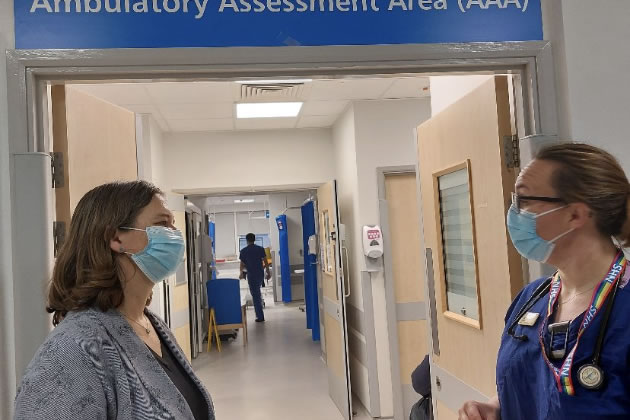Situation at St George's Hospital Described as Chaotic
MP tells of mass resignations and mental health patients kept in A&E for days

Fleur Anderson outside the Accident and Emergency unit at St. George's Hospital
Mental health patients at St. George's Hospital are being treated in A&E for five days and 60 nurses have resigned from one department, a local MP has revealed. Putney MP Fleur Anderson said the situation facing St George’s Hospital in Tooting is “chaotic†while the NHS is in crisis.
Ms Anderson said staff had been forced to treat patients in corridors for the first time in the hospital’s history. St George’s NHS Trust announced it was under “extreme pressure†earlier in January – and expects to be “very busy†over the coming months.
It comes as A&Es across Britain face crisis amid huge pressures – with record waiting times and hospital corridors turned into makeshift wards as beds on the real wards are full.
Ms Anderson told the House of Commons on 11 January that “pain, suffering and preventable deaths are up, GP waiting times are up, A&E waiting times are up, mental health and cancer assessment times are up†and said there are “huge gaps in community careâ€.
The MP said she “didn’t realise how bad†the crisis was until she visited St George’s A&E last week – where staff are “broken-hearted†at having to treat patients in corridors for the first time in the hospital’s history.
She said, “All the doctors and nurses I spoke to agreed that this was the worst time they’ve ever experienced in their whole careers. The Winter Ward was opened last year but had to stay open for the whole year and so there’s now no more space for the extra winter surge.
“Sixty nurses have resigned from that department because of the stress of the workload and underpay. The additional winter payments which came from the government were only paid in December and have to be spent by March, giving them hardly any real impact.â€
Ms Anderson added, “They’ve had to stop elective heart surgery since the beginning of December, mental health patients are being treated in A&E for five days.â€
She said the hospital needed a “long-term plan, not being surprised by winter every yearâ€.
She continued, “This is not simply a consequence of Covid – it is a consequence of an underfunded system that has been run beyond capacity for years by this Conservative Government. GP, A&E, mental health and cancer assessment times are up across the country. This snowballs until the whole NHS treatment pipeline is jammed and conditions worsen, increasing financial pressures on the system and professional pressures on staff.
"It is crucial that we understand this in the context of the whole healthcare system. Social care is broken after over a decade of neglect. Staff at St George’s told me that every year, there are four areas that they see as being critical community care shortages: eating disorders, Korsakoff dementia patients, frail patients who have a stroke after a fall and functional neurological disorder. These are huge gaps in community care."

Fleur Anderson talks to staff at St. George's Hospital
Recently published data from the NHS has revealed that in October 2022, over 6500 people in Putney had to wait more than two weeks to get an appointment with a GP. 886 people in the area were required to wait over a month.
Nationally, only 77.8% of patients with an urgent GP referral for suspected cancer saw a specialist within two weeks in 2022. This figure had never dipped below 90% since records began until 2019.
More than 1.3 million people are currently waiting more than a month to see their GP, with 4,500 fewer GPs in England than a decade ago.
In an earlier statement issued earlier in the month, the hospital trust said its teams are “working hard†to see A&E patients as quickly as possible, “but right now – like all parts of the NHS – we are not always able to provide the level of care we would like, and we are very sorry this is the caseâ€.
The trust added that it is putting measures in place to try to ease pressures – including opening up extra beds, supporting elderly and frail people in their homes to avoid A&E admissions and introducing a “hospital at home†and remote monitoring service.
It said, “It’s still really important you continue to come forward for the care you need. If it’s an emergency or life-threatening, then please dial 999 or go to an emergency department as normal.â€
January 12, 2023